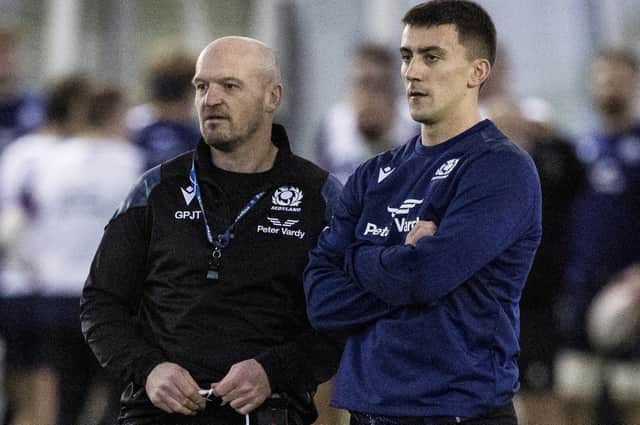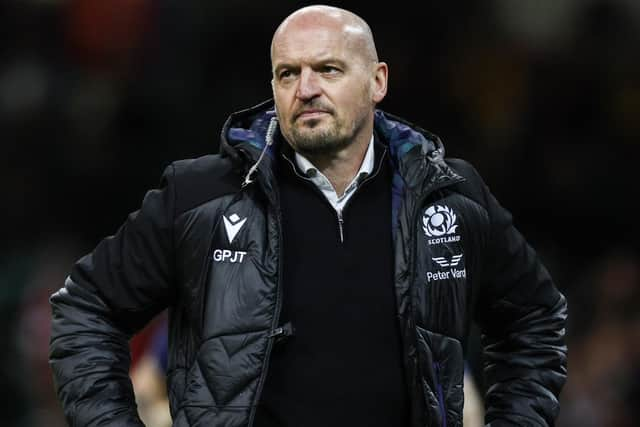Six Nations selection ends century of national service by Borders rugby


That win at the weekend, their first in Cardiff since 2002, might have seen a side overseen by Gala’s Gregor Townsend retain the Doddie Weir Cup, contested in memory of the Borders rugby legend of that name, but it was the Scots’ first fixture without any representatives of the region in their match-day 23 for over six years.
The last time that happened saw Hawick’s Stuart Hogg picked to start against Australia in November 2017 at Edinburgh’s Murrayfield Stadium but then injure his hip in the pre-match warm-up, forcing Townsend, appointed as head coach earlier that year, to draft in Sean Maitland to replace him at full-back for the ensuing 53-24 autumn test victory.
Advertisement
Hide AdAdvertisement
Hide AdThe last occasion no Borderers were selected for a Scotland international fixture was over 92 years prior to that, however – back in January 1925 for a 25-4 win versus France at Inverleith in Edinburgh – research by Borders Rugby TV founder Stuart Cameron and Glasgow Warriors statistician Kevin Millar reveals.


There’s only one Borderer in Townsend’s squad at the moment, Jedburgh’s Glen Young, though he’s expected to be joined by Hawick’s Darcy Graham, currently out injured, in time for Scotland’s Calcutta Cup game at home to England on Saturday, February 24.
Edinburgh lock Young wasn’t among the ten Scottish-born players to get the nod to line up alongside their South African, Australian and English team-mates for Saturday’s tournament opener so the nearest thing to a Borderer in captain Finn Russell’s side was Bath centre Cameron Redpath, brought on as a 71st-minute replacement for Luke Crosbie for his tenth cap.
The 24-year-old is one of Galashiels-born former Melrose scrum-half and Scotland captain Bryan Redpath’s sons but was born in Narbonne in the south of France, 1,100 miles south of the southernmost bit of the Borders, so though he was the closest thing to a representative of the region at the weekend, he can’t, to be honest, be regarded as having been all that close.
Advertisement
Hide AdAdvertisement
Hide AdCameron regards it as both a credit to the region that it took just short of a century, 30 years on from the sport going professional, to get to this point and a shame that the days of a squad featuring seven Borderers, Townsend and Weir among them, winning a grand slam for Scotland are now long gone.


“The main stat in all this is the fact that Borderers have been selected for Scottish teams for the last 99 years, and back in 2017 Stuart Hogg was selected, ran out with the team and was warming up but got injured so he couldn’t take any part in the game,” he said.
“We acknowledge that he didn’t play but that’s not something that spoils the Borders’ 99 years of representation in Scotland teams as he was actually selected, whereas the weekend’s team obviously does.
“A lot of people are saying ‘oh, but Cameron Redpath’s dad is Bryan Redpath’, but he was born in France and he’s never lived or played in the Borders, so you can’t really stretch the definition of a Borderer to that limit.”
Advertisement
Hide AdAdvertisement
Hide AdCameron cautions that perceptions of the region’s status as a recruiting ground for the national team are likely to be coloured by the fact it’s yielded three of Scotland’s four most-capped players of all time, with their careers overlapping for almost all of this century so far – Hogg, Gala’s Chris Paterson and Kelso’s Ross Ford having accumulated respectively 100 caps between 2012 and last year, 109 from 1999 to 2011 and 110 from 2004 to 2017 – following on from handfuls of Borderers at a time being given starting XV places from the 1980s onwards.
Going back further, though, teams often featured only a single representative of the region, as had been the case, until Saturday, since Hogg’s retirement last July at the age of 31, he explained.
“We had that period when we had Stuart Hogg, Ross Ford, Chris Paterson and Greig Laidlaw all in the team at more or less the same time,” he said.
“Looking back beyond the 1940s, though, there was literally just one Borderer in quite a few times, but there was always at least one until we got back 99 years, and that was a grand slam year as well.
Advertisement
Hide AdAdvertisement
Hide Ad“I never believed I’d have to go back as far as 99 years, and the irony of it all is the fact that it was a Borderer, in Gregor Townsend, that didn’t select Glen Young and stopped that sequence, though I’m sure he wouldn’t have realised at the time. That’s just the way it is.
“It’s now come to an end and that’s basically it.
“To have that incredible record kept up for all those years is testament to how strong Borders rugby was and it’s also a nod to the future in the form of the worrying aspect that we’ve only got one or two Borderers in contention now and god knows who the next cap from the region will be as the pathway doesn’t seem to have been there ever since pro rugby stopped in the Borders.
“I think this is how it’s going to be now. After 99 years of having an unbroken run, I think we’re likely to get quite a few instances of internationals in the very near future with no Borderers featuring, and that’s just a sign of the times. It’s all changing.”
Two of Scotland’s tries on Saturday were scored by Duhan van der Merwe – taking his international tally to 23, just one behind current top-scorer Graham and four off Hogg’s all-time record of 27 – and the other by fellow South African Pierre Schoeman, with Russell converting all three and also kicking two penalties.
Advertisement
Hide AdAdvertisement
Hide AdTheir hosts’ tries were touched down by James Botham, Rio Dyer, Aaron Wainwright and Alex Mann, with Ioan Lloyd adding three conversions.
Scotland’s second game of the tournament is at home to France this coming Saturday, with kick-off at 2.15pm.